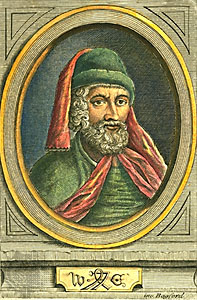William Caxton
Appearance

William Caxton (c. 1420 – 1492) was the first English printer and publisher. He was also a prolific translator of French romances, and an author in his own right.
| This article on an author is a stub. You can help out with Wikiquote by expanding it! |
Quotes
[edit]- And thus love is founded otherwhile upon good prouffitable and this love endureth as longe as he seeth his prouffit. And herof men saye a comyn proverbe in England that love lasteth as longe as the money endureth and whan the money faylleth than there is no love.
- The Game and Playe of the Chesse, Bk. III (1474) [1]
- The worshipful fader and first foundeur and enbelissher of ornate eloquence in our Englissh. I mene Maister Geffrey Chaucer.
- Epilogue to Boethius De Consolacione Philosophie (1478); cited from Daniel Wakelin Humanism, Reading, and English Literature, 1430-1530 (Oxford: Oxford University Press, 2007) p. 15.
- He that wil wynne he muste laboure and aventure.
- The History of Reynard the Foxe (1481); cited from Edward Arber An Introductory Sketch to the Martin Marprelate Controversy, 1588-1590 (New York: AMS Press, 1967) p. 27.
- Al these thynges consydered, there can no man resonably gaynsaye but there was a kyng of thys lande named Arthur. For in al places, Crysten and hethen, he is reputed and taken for one of the nine worthy, and the fyrst of the thre Crysten men.
- Preface to Sir Thomas Malory Le Morte Darthur (1485); cited from Sir Thomas Malory (ed. Eugène Vinaver) Works (Oxford: Oxford University Press, 1978) p. xiv.
- For we Englysshe men ben borne under the domynacyon of the mone, whiche is never stedfaste but ever waverynge, wexynge one season and waneth and dyscreaseth another season. And that comyn Englysshe that is spoken in one shyre varyeth from a-nother, in so moche that in my dayes happened that certayn marchauntes were in a ship in Tamyse for to have sayled over the see into Zelande, and, for lacke of wynde, thei taryed atte Forlond, and wente to lande for to refreshe them. And one of theym named Sheffelde, a mercer, cam in to an hows and axed for mete and specyally he axyd after eggys, and the goode wyf answerde that she could speke no Frenshe. And the marchaunt was angry, for he also coude speke no Frenshe, but wolde have hadde egges; and she understode hym not. And thenne at laste a-nother sayd that he wolde have eyren. Then the good wyf sayd that she understod hym wel. Loo, what sholde a man in thyse dayes now wryte, egges, or eyren? Certaynly it is hard to playse every man, by-cause of dyversite and chaunge of langage.
- For we Englishmen are born under the domination of the moon, which is never steadfast but ever wavering, waxing one season and waning and decreasing another season. And that common English that is spoken in one shire varies from another, so that in my days it happened that certain merchants were in a ship on the Thames to sail over the sea to Zealand, and for lack of wind, they tarried at Foreland, and went to land to refresh themselves. And one of them named Sheffelde, a mercer, came to a house and asked for food, and especially he asked for egges, and the good woman answered that she could speak no French. And the merchant was angry, for he also could speak no French, but wanted to have egges, and she did not understand him. And then at last another said that he wanted eyren. Then the good woman said that she understood him well. Lo, what should a man in these days now write, egges or eyren? Certainly it is hard to please every man, because of diversity and change of language.
- Preface to the Eneydos, 1490.
External links
[edit] Encyclopedic article on William Caxton on Wikipedia
Encyclopedic article on William Caxton on Wikipedia Works related to Author:William Caxton on Wikisource
Works related to Author:William Caxton on Wikisource Media related to William Caxton on Wikimedia Commons
Media related to William Caxton on Wikimedia Commons
